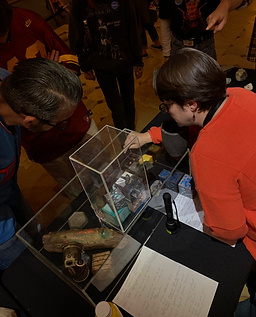top of page
Geomicrobiology
Fossil Fest 2025
Fossil Fest is an annual event at the Alf Museum of Paleontology in Claremont, California hosting over 500 people. A colleague and I set up and hosted a booth on behalf of USC Paleosciences. Our long table display invited guests to take a walk with reef builders and dwellers over the last ~1 billion years of Earth's history as we introduced microbialites (such as stromatolites and microbially induced sedimentary structures), and metazoans such as sponges, early bioirrigators and carbonate skeletonizers, stromatoporoids, cnidarians, echinoderms, bivalves, bryozoans, cephalopods, vertebrates, and more.


Haunted Museum 2024
Haunted Museum is an annual celebration at the Natural History Museum of Los Angeles County where we showcase the fun and potentially spooky parts of science for several thousand guests from LA and around Southern California. This year, our (the Dept. of Mineral Sciences) booth showcased the real life minerals of the Minecraft video game along with a collection of fluorescent and phosphorescent minerals under UV light.
T-Rex skull cast at the Dino Institute booth
Our booth showcasing shallow marine fossils from 1 billion years ago to the present day and evolutionary transitions therein, co-presented with my USC paleosciences labmate, Sam.


My head (left), tyrannosaur head (right)

Our Minerals and Minecraft booth and brilliant collections manager, Kriss. Photo taken by me.
Dino Fest 2024
Dino Fest is an annual event at the NHMLA showcasing everything dinosaurs and attended by over 5,000 people per year. I partnered with my dinosaur paleontologist colleague Emily Patellos to teach guests about the mineralogy of the "Gnatalie" sauropod dinosaur (on display Nov 17th at the NHMLA). Dinosaur bones excavated from the Gnatalie quarry have been partially replaced by a green mica mineral called celadonite. During this year's Dino Fest, I enjoyed connecting mineralogy and paleontology through teaching about the diagenetic processes that lead to mineral replacement in fossils!

Gnatalie's vertebrae, where green celadonite patches are visible. Preparation of her skeleton has taken 14 years, and when she goes on display this November, she will be the only green dinosaur on exhibit at any museum in the world.
Letters to a Pre-Scientist Pen Pal

2024-2025 Academic Year
Award Earned: Exceptionally Engaging Letters
LPS is a program connecting K-12 students with STEM professionals as penpals.

Haunted Museum 2023

We showcased a table with several spooky "fossil graveyards" to introduce guests to fossil specimens from a variety of environments. Graveyard themes were California coast, ancient terrestrial, and ancient shallow marine ecosystems.
Fossil Graveyards display
Dino Fest 2023
Dino Fest is an annual event at the NHMLA showcasing everything dinosaurs and attended by over 5,000 people per year. The 2023 booth included an array of dinosaurs and marine reptiles including mosasaurs, icthyosaurs, and plesiosaurs.

The Dino Fest '23 team
Fossil Fest 2022

Fossil Fest is an annual event at the Alf Museum of Paleontology in Claremont, California hosting over 500 people. I set up and hosted a booth on behalf of USC Paleosciences focused on microbialites and astrobiology. Conversations with kids of all ages, parents, and paleontology enthusiasts focused on the rock record of microbial life on Earth in both the Precambrian and Phanerozoic. With a diverse array of fossil microbial textures and some non-microbial lookalikes on display, guests were introduced to the ecosystems that dominated the biosphere for 7/8ths of Earth's history, and which garner high astrobiological interest in the search for life outside of Earth.
bottom of page